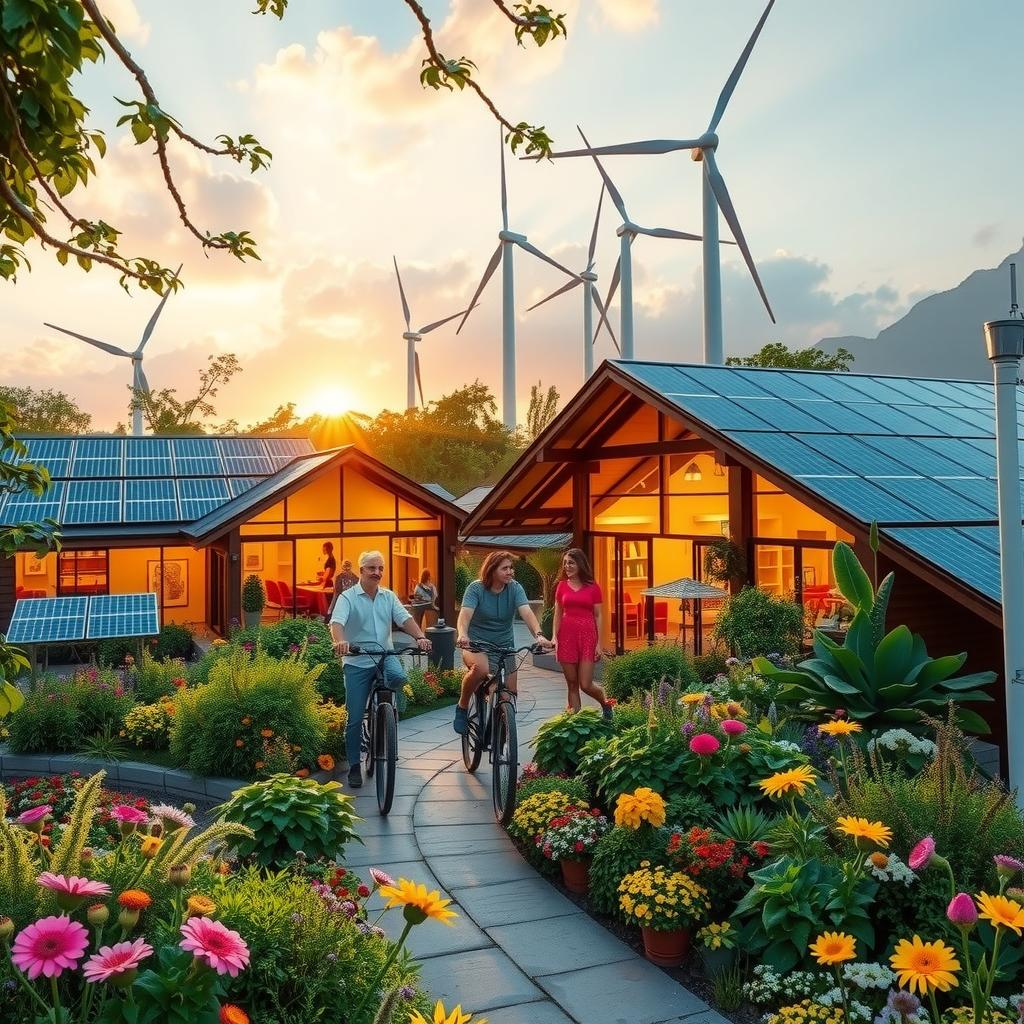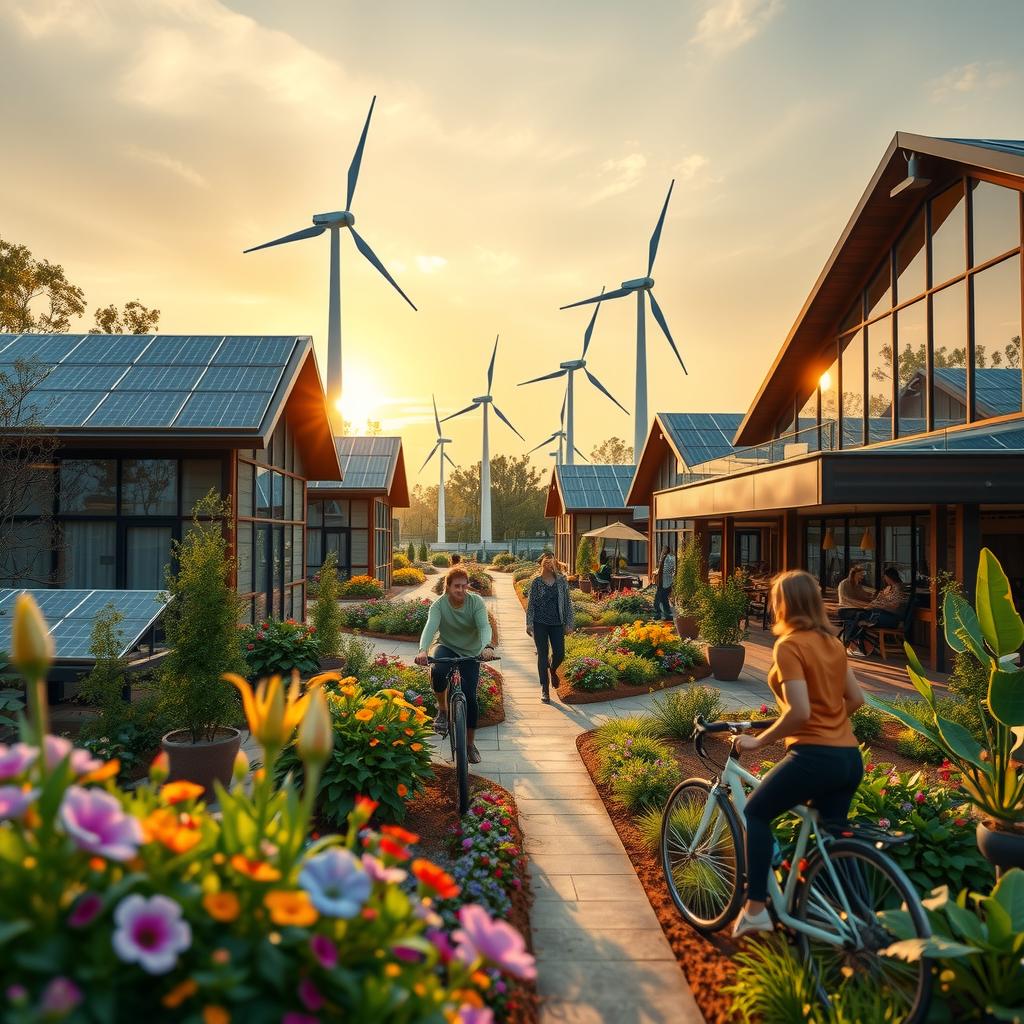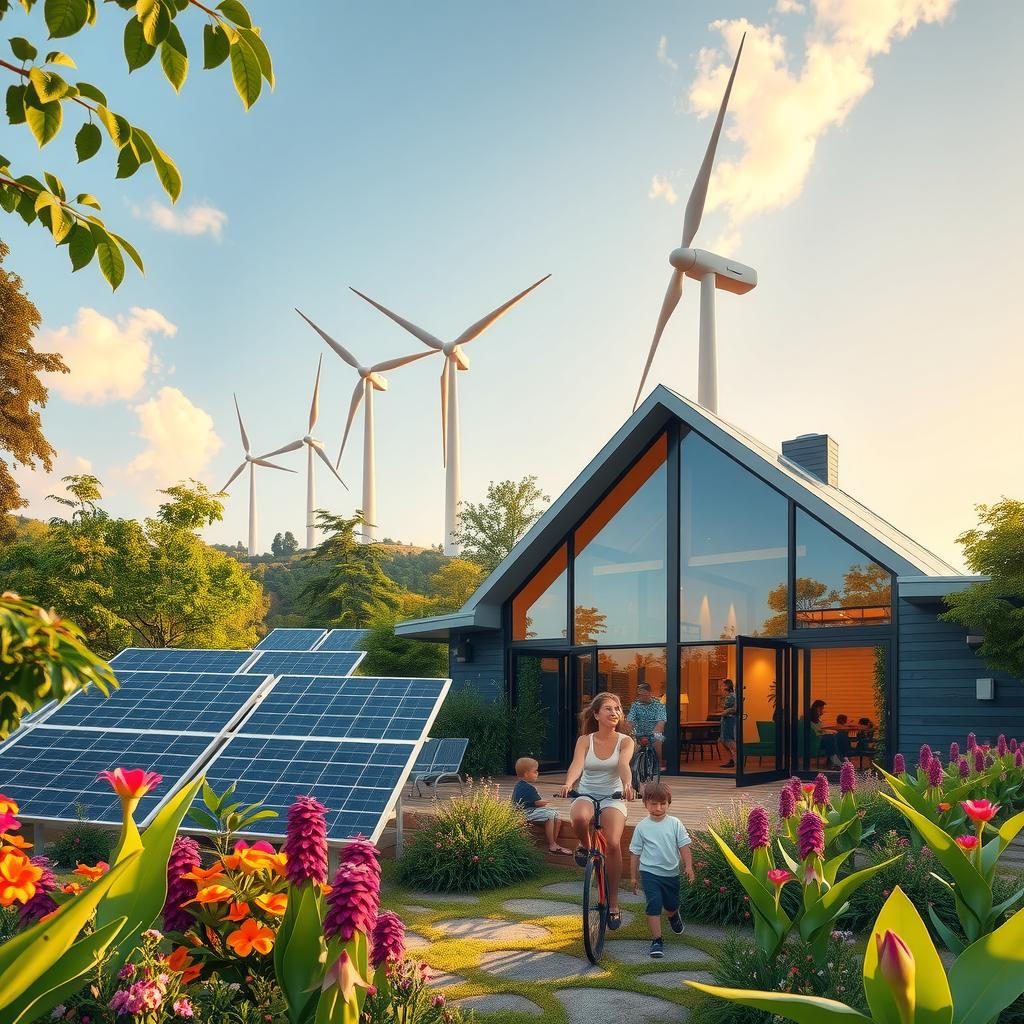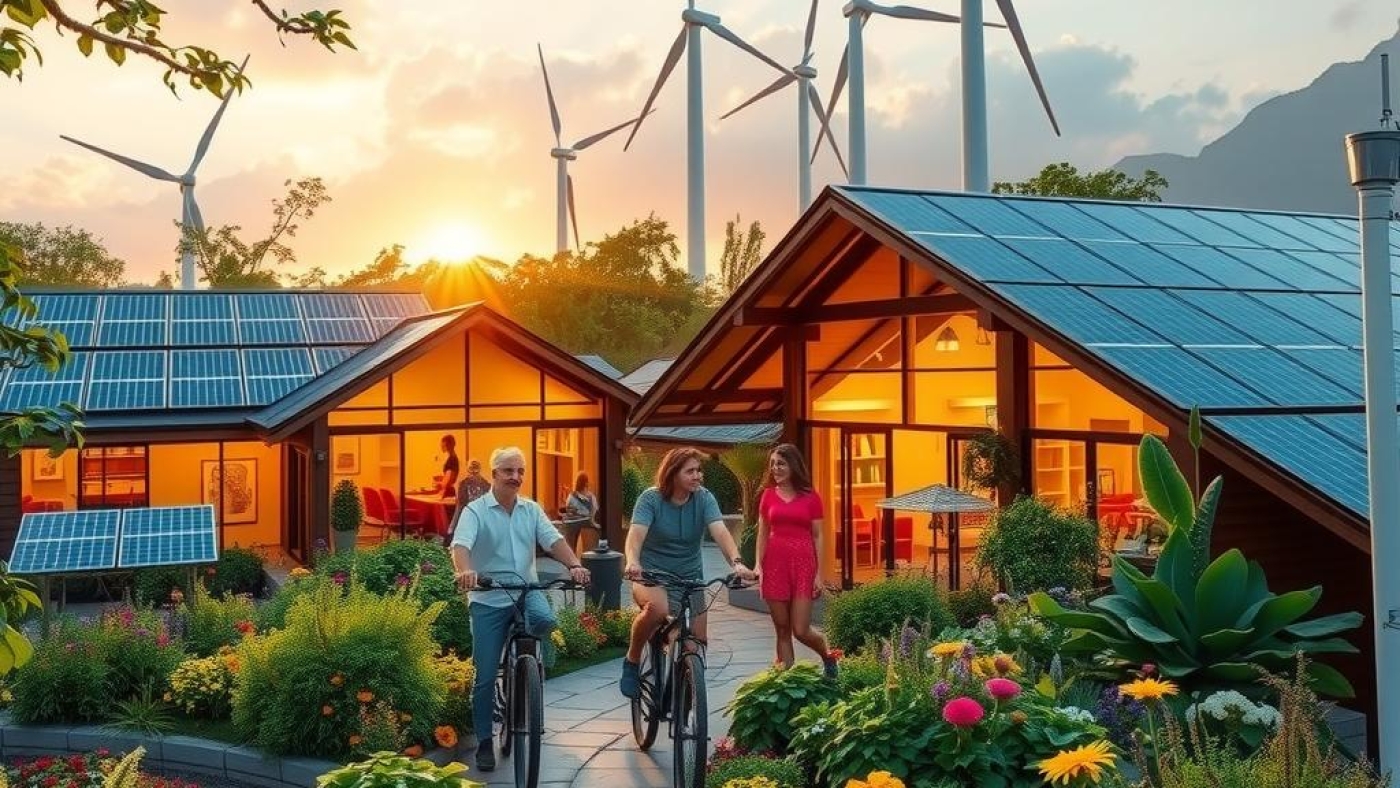Renewable Energy is rapidly transforming the tourism industry, offering a sustainable solution to the sector’s reliance on fossil fuels. As global environmental awareness grows, travelers and tourism operators alike are increasingly seeking ways to minimize their carbon footprint and promote eco-friendly practices. The integration of Renewable Energy technologies, such as solar power and wind power, is proving to be a game-changer, enabling the industry to reduce its energy consumption and environmental impact while also lowering operating costs.
The tourism industry is a significant contributor to global energy consumption and greenhouse gas emissions, with a significant portion of its energy needs being met by fossil fuels. This reliance on non-renewable resources not only exacerbates the climate crisis but also exposes the industry to the volatility of fossil fuel prices. The adoption of Renewable Energy solutions, however, offers a sustainable alternative that can effectively address these challenges.
Solar power and wind power are two of the most prominent Renewable Energy technologies being embraced by the tourism industry. These clean energy sources are being integrated into various aspects of the industry, from powering green building materials and energy-efficient technologies in hotels and resorts to fueling transportation and other operational needs. By transitioning to Renewable Energy, the tourism industry can not only reduce its environmental impact but also capitalize on the long-term cost savings and energy security benefits these technologies provide.
Moreover, the incorporation of Renewable Energy solutions aligns with the growing environmental awareness among travelers. Eco-conscious consumers are increasingly seeking out tourism operators and destinations that prioritize sustainability and offer Renewable Energy-powered experiences. This shift in consumer preferences is driving the tourism industry to accelerate its adoption of Renewable Energy technologies, further solidifying its position as a crucial component of the industry’s future.

Principal Considerations:
-
Renewable Energy Integration in Tourism Facilities: Many tourism establishments are increasingly adopting renewable energy sources, such as solar and wind power, to reduce their dependence on fossil fuels.
-
Eco-Friendly Building and Operations: By employing green building materials and energy-efficient technologies, hotels and resorts can significantly lower their overall energy consumption.
-
Environmental Impact Mitigation: The utilization of Renewable Energy solutions not only alleviates the environmental impact of tourism facilities but also reduces their operating costs.
-
Enhancing Guests’ Sustainability Awareness: Implementing Renewable Energy initiatives helps raise environmental awareness among guests, promoting sustainable practices in the tourism industry.
-
Cost-Effective and Sustainable Solutions: Renewable Energy adoption provides tourism establishments with cost-effective and environmentally-friendly alternatives, contributing to the industry’s sustainable future.

Renewable Energy’s Ascent in the Tourism Sector
Powering a Sustainable Future
The tourism industry has long been a major contributor to global energy consumption and environmental impact. However, the rise of renewable energy technologies, such as solar and wind power, has ushered in a new era of sustainability for this thriving sector. As the world becomes increasingly conscious of the need to reduce our reliance on fossil fuels and mitigate the effects of climate change, the tourism industry has embraced the adoption of renewable energy solutions to power their operations and reduce their carbon footprint.
The shift towards renewable energy in the tourism industry has been driven by a growing awareness of the environmental consequences of traditional energy sources. The industry’s significant energy demands, from powering hotels and resorts to fueling transportation, have made it a prime target for sustainable energy initiatives. By harnessing the abundant and renewable power of the sun and wind, tourism operators can not only reduce their environmental impact but also reap the economic benefits of lower energy costs and increased energy independence.
One of the most prominent examples of this shift is the widespread adoption of solar power in the tourism sector. Many hotels, resorts, and eco-lodges have installed rooftop solar panels or integrated solar energy systems into their infrastructure, allowing them to generate their own clean electricity and reduce their reliance on the grid. This not only helps to lower their carbon emissions but also insulates them from fluctuations in fossil fuel prices, providing long-term cost savings and energy security.
In addition to solar power, the tourism industry has also embraced wind power as a renewable energy solution. Coastal and island destinations, in particular, have leveraged the consistent and powerful wind patterns to generate clean electricity for their operations. By integrating wind turbines into their energy mix, tourism businesses can further reduce their environmental footprint and contribute to a more sustainable future.
The commitment to renewable energy in the tourism industry extends beyond just energy generation. Sustainable building practices, the use of energy-efficient technologies, and the implementation of green building materials have also become increasingly common in the sector. These initiatives, combined with the adoption of renewable energy solutions, create a holistic approach to environmental stewardship and help to reduce the industry’s overall energy consumption and carbon emissions.
As the world continues to grapple with the pressing issue of climate change, the tourism industry’s embrace of renewable energy stands as a shining example of the transformative power of sustainable practices. By harnessing the sun and wind to power their operations, tourism businesses are not only contributing to a greener future but also setting a precedent for other industries to follow.
Embracing Solar and Wind Power
The tourism industry’s journey towards sustainability has been largely driven by the widespread adoption of solar power and wind power as renewable energy sources. These technologies have emerged as game-changers, providing tourism operators with the means to reduce their reliance on fossil fuels and minimize their environmental impact.
The integration of solar power into the tourism sector has been particularly transformative. Many hotels, resorts, and eco-lodges have installed rooftop solar panels or integrated solar energy systems into their infrastructure, allowing them to generate their own clean electricity. This not only helps to lower their carbon emissions but also insulates them from the volatility of fossil fuel prices, providing long-term cost savings and energy security.
Similarly, the tourism industry has also embraced wind power as a renewable energy solution, particularly in coastal and island destinations where consistent wind patterns can be harnessed. By installing wind turbines, these tourism businesses can further reduce their environmental footprint and contribute to a more sustainable future.
The benefits of this shift to renewable energy extend beyond just environmental considerations. The adoption of solar power and wind power has also led to significant cost savings for tourism operators, as they are able to generate their own electricity and reduce their reliance on traditional energy sources. This, in turn, can lead to more competitive pricing for travelers, making sustainable tourism more accessible and attractive to a wider audience.
Moreover, the tourism industry’s commitment to renewable energy has had a ripple effect on the broader public. As travelers become more aware of the industry’s efforts to reduce its environmental impact, they are more likely to seek out and support tourism businesses that prioritize sustainability. This increased demand for eco-friendly travel options further incentivizes the tourism sector to continue its transition towards a renewable energy-powered future.
Driving Sustainability through Green Building and Technology
The tourism industry’s embrace of renewable energy is just one aspect of a broader commitment to sustainability. Alongside the adoption of solar power and win

Greening the Hospitality Sector: Sustainable Building Materials and Energy-Efficient Technologies
Embracing Sustainable Building Materials
The hospitality industry has a significant environmental impact, with buildings accounting for a substantial portion of energy consumption and greenhouse gas emissions. To address this challenge, the sector is increasingly embracing the use of sustainable building materials that not only reduce the environmental footprint but also enhance the overall guest experience. Materials such as renewable energy-sourced bamboo, recycled glass, and reclaimed wood are becoming popular choices, offering both aesthetic appeal and exceptional durability. These materials not only reduce the reliance on fossil fuel-dependent resources but also contribute to the creation of healthier indoor environments, promoting guest well-being. By incorporating these sustainable building solutions, hospitality establishments can demonstrate their commitment to environmental stewardship and differentiate themselves in the marketplace.
Harnessing the Power of Energy-Efficient Technologies
In parallel with the adoption of sustainable building materials, the hospitality sector is also embracing a range of energy-efficient technologies to optimize their energy consumption and reduce their carbon footprint. Renewable energy solutions, such as solar panels and wind turbines, are being integrated into hotel designs, allowing establishments to generate their own clean, renewable energy and reduce their reliance on fossil fuel-based power sources. Additionally, advancements in LED lighting, smart HVAC systems, and intelligent building automation technologies are enabling hotels to significantly improve their energy efficiency, leading to substantial cost savings and a lower environmental impact. By leveraging these innovative technologies, hospitality businesses can not only enhance their sustainability credentials but also improve their overall operational efficiency and profitability.
Fostering a Culture of Environmental Awareness
Alongside the implementation of sustainable building materials and energy-efficient technologies, the hospitality industry is also actively fostering a culture of environmental awareness among its employees and guests. Through comprehensive training programs and engaging guest outreach initiatives, hotels are educating stakeholders on the importance of sustainability and the collective efforts required to reduce the industry’s environmental impact. This heightened awareness is leading to the adoption of more eco-friendly practices, such as the reduction of fossil fuel-based energy consumption, the minimization of waste, and the promotion of renewable energy usage. By empowering its workforce and guests to become active participants in the sustainability journey, the hospitality sector is driving meaningful change and positioning itself as a leader in the quest for a more sustainable future.
Embracing the Future of Sustainable Hospitality
The hospitality industry’s transition towards a more sustainable future is a multifaceted endeavor that requires a holistic approach. By integrating renewable energy solutions, energy-efficient technologies, and eco-friendly building materials, hospitality establishments can significantly reduce their environmental impact and operational costs. Moreover, by fostering a culture of environmental awareness among employees and guests, the industry can inspire meaningful change and contribute to the global sustainability movement. As the demand for sustainable travel and hospitality experiences continues to grow, the hospitality sector’s commitment to embracing renewable energy and innovative green technologies will be a key differentiator in the market, positioning it as a responsible and forward-thinking industry that is shaping a more sustainable future.
“Cost Savings and Guest Satisfaction: The Business Case for Renewable Energy in Tourism”
Renewable Energy: Powering a Sustainable Tourism Industry
The tourism industry is a significant contributor to global energy consumption and greenhouse gas emissions. However, the growing demand for eco-friendly and sustainable practices has led many tourism businesses to explore the benefits of renewable energy. By investing in renewable energy technologies, such as solar power and wind power, tourism operators can not only reduce their environmental impact but also achieve significant cost savings and enhance guest satisfaction.
One of the primary drivers for the adoption of renewable energy in the tourism industry is the potential for long-term cost savings. While the initial investment in renewable energy infrastructure may be higher, the operational costs are significantly lower compared to traditional fossil fuel-based energy sources. Solar power and wind power systems, for instance, have minimal maintenance requirements and provide a stable, predictable source of energy, allowing tourism businesses to better manage their energy expenses and budget more effectively. This financial flexibility can then be passed on to guests in the form of more competitive pricing or reinvested into other aspects of the business, such as facility upgrades or guest amenities, further enhancing the overall guest experience.
Moreover, the implementation of renewable energy strategies can serve as a powerful marketing tool for tourism businesses, as environmentally conscious travelers are increasingly seeking out eco-friendly accommodations and activities. By showcasing their commitment to sustainability through the use of renewable energy, tourism operators can attract a growing segment of the market that prioritizes environmental responsibility. This, in turn, can lead to improved guest satisfaction, positive reviews, and increased loyalty, ultimately contributing to the long-term success and profitability of the business.
Embracing Sustainable Design and Technologies
In addition to renewable energy solutions, the tourism industry is also exploring other sustainable design and technology practices to reduce energy consumption and environmental impact. The use of energy-efficient building materials, such as green building materials, and the integration of energy-efficient technologies, like smart thermostats and LED lighting, can significantly lower a tourism business’s energy consumption and operating costs. These strategies not only benefit the environment but also demonstrate to guests the company’s dedication to sustainability, further enhancing the overall guest experience.
Navigating the Transition to Renewable Energy
While the transition to renewable energy may present some initial challenges, such as navigating regulatory frameworks and securing necessary financing, the long-term benefits for both the tourism industry and the environment are undeniable. By taking proactive steps to reduce their fossil fuel dependence and embrace renewable energy solutions, tourism businesses can position themselves as industry leaders in environmental awareness and sustainability, setting the stage for continued growth and success in an increasingly eco-conscious marketplace.
Integrating Renewable Energy with Guest Experiences
Beyond the operational and financial benefits, the integration of renewable energy into the guest experience can also play a significant role in enhancing visitor satisfaction. By educating guests about the tourism business’s renewable energy initiatives and providing opportunities for them to engage with and learn about the technology, businesses can foster a deeper appreciation for sustainability and encourage guests to adopt eco-friendly practices in their own lives.
Toward a Sustainable Future in Tourism
The adoption of renewable energy in the tourism industry is not just a trend, but a strategic imperative for businesses aiming to thrive in an era of heightened environmental consciousness. By embracing the cost-saving and guest satisfaction benefits of renewable energy, tourism operators can position themselves as leaders in the transition to a more sustainable future, creating a win-win scenario for their business, their guests, and the planet as a whole.
Inspiring Environmental Stewardship: How Renewable Energy Enhances the Guest Experience
The Pivotal Role of Renewable Energy in Sustainable Tourism
The tourism industry has a significant impact on the environment, with energy consumption being a major contributor to its environmental footprint. As travelers become increasingly conscious of their environmental impact, the demand for sustainable tourism practices has grown. Renewable Energy plays a pivotal role in addressing this demand, enhancing the guest experience while reducing the industry’s environmental impact.
Renewable Energy, such as solar power and wind power, offers a clean and sustainable alternative to traditional fossil fuel-based energy sources. By integrating Renewable Energy into their operations, tourism businesses can significantly reduce their carbon footprint and operating costs, while also providing guests with a more environmentally-friendly experience.
One of the key benefits of Renewable Energy in the tourism industry is its ability to power eco-friendly accommodations and amenities. Renewable Energy-powered hotels and resorts can offer guests a more immersive and authentic nature-based experience, showcasing the property’s commitment to sustainability. This not only aligns with the values of environmentally-conscious travelers but also provides a unique selling point that can differentiate the business from its competitors.
Moreover, the installation of Renewable Energy systems, such as solar panels or wind turbines, can also serve as educational opportunities for guests. By showcasing the technology and its environmental benefits, tourism businesses can foster a deeper understanding and appreciation for sustainable practices among their guests. This can, in turn, inspire them to adopt more eco-friendly behaviors in their own lives, extending the positive impact of the tourism experience.
In addition to the environmental benefits, Renewable Energy can also enhance the overall guest experience by providing a reliable and consistent source of power. Guests are increasingly expectant of uninterrupted access to electricity and technology during their stays, and Renewable Energy systems can help ensure a seamless and enjoyable experience, even in remote or off-grid locations.
Furthermore, the integration of Renewable Energy can also contribute to the overall aesthetic and ambiance of a tourism property. Renewable Energy-powered facilities can be designed and integrated seamlessly into the surrounding landscape, creating a harmonious and visually appealing environment that aligns with the property’s overall sustainability ethos.
By embracing Renewable Energy, the tourism industry can not only reduce its environmental impact but also position itself as a leader in sustainable practices. This can help attract environmentally-conscious travelers, improve the guest experience, and contribute to the long-term viability and success of the industry as a whole.
-
The Rise of Renewable Energy in the Tourism Industry
As the tourism industry grapples with the need to reduce its environmental footprint, the adoption of Renewable Energy has emerged as a crucial strategy. Many tourism facilities are now turning to solar and wind power to reduce their reliance on fossil fuels, leading to a more sustainable future. -
Green Lodging: Enhancing Guests’ Environmental Awareness
By incorporating Renewable Energy sources, hotels and resorts are not only lowering their energy consumption but also sending a powerful message to their guests. This not only alleviates the environmental impact but also serves to enhance guests’ awareness and appreciation for sustainable practices. -
Cost-Effective and Eco-Friendly: The Dual Benefits of Renewable Energy
The implementation of Renewable Energy technologies in the tourism industry not only reduces operating costs but also demonstrates a commitment to environmental stewardship. This synergistic approach allows tourism facilities to balance their financial and ecological responsibilities, paving the way for a more sustainable future. -
Embracing Innovation: Renewable Energy Powering the Tourism Industry’s Green Transformation
As the tourism industry continues to evolve, the integration of Renewable Energy solutions has become a hallmark of forward-thinking establishments. By adopting green building materials and energy-efficient technologies, these facilities are setting new standards for sustainability and environmental responsibility. -
Renewable Energy: Driving the Tourism Industry’s Sustainable Future
The tourism industry’s embrace of Renewable Energy sources, such as solar and wind power, is a testament to its commitment to environmental preservation. By reducing fossil fuel dependence and lowering energy consumption, these tourism facilities are not only minimizing their impact on the planet but also enhancing their guests’ overall experience.
FAQs:
Q: How are tourism facilities utilizing Renewable Energy to reduce their environmental impact?
A: Many tourism facilities are turning to renewable energy sources, such as solar and wind power, to reduce their reliance on fossil fuels and lower their energy consumption. This not only alleviates the environmental impact but also reduces operating costs and enhances guests’ awareness of sustainable practices.
Q: What are the benefits of incorporating Renewable Energy in the tourism industry?
A: The incorporation of Renewable Energy in the tourism industry offers dual benefits. It not only reduces operating costs but also demonstrates a commitment to environmental stewardship, allowing tourism facilities to balance their financial and ecological responsibilities. This, in turn, contributes to a more sustainable future for the industry.
Q: How are tourism facilities using green building materials and energy-efficient technologies to support their Renewable Energy initiatives?
A: By adopting green building materials and energy-efficient technologies, tourism facilities are able to further enhance the impact of their Renewable Energy initiatives. This integrated approach allows these establishments to set new standards for sustainability and environmental responsibility, driving the tourism industry’s green transformation.
Q: What role does guest awareness play in the tourism industry’s embrace of Renewable Energy?
A: The tourism industry’s adoption of Renewable Energy sources, such as solar and wind power, not only reduces the environmental impact but also serves to enhance guests’ awareness and appreciation for sustainable practices. This helps to create a more holistic and enriching experience for travelers, solidifying the industry’s commitment to a sustainable future.
Q: How is the tourism industry’s use of Renewable Energy contributing to a more sustainable future?
A: The tourism industry’s embrace of Renewable Energy sources, such as solar and wind power, is a testament to its commitment to environmental preservation. By reducing fossil fuel dependence and lowering energy consumption, these tourism facilities are minimizing their impact on the planet and paving the way for a more sustainable future for the industry as a whole.
